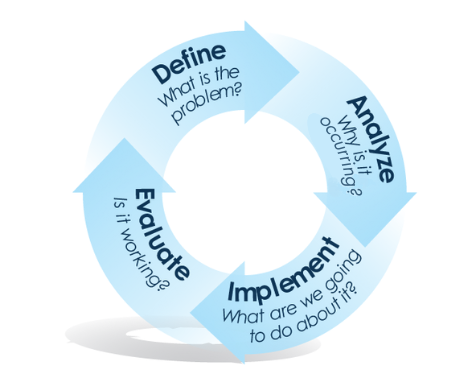Foundations for Implementation
Problem-Solving

Problem-Solving Process
The problem-solving process uses data to plan, deliver, and evaluate a multi-tiered system of supports. It is a structured process that includes:
- The people who are affected by the problem, working with people who can help
- A deliberate focus on using each step of the process with fidelity
- Analysis that focuses on things people can control
- Follow-up that includes a review of data to make sure the strategies made a difference

Problem-Solving Model
The problem-solving model is an evidence-based way of work that can be applied to any level:
- individual/inter-personal
- small groups
- organizations (schools, districts, state)
When used with fidelity, the problem-solving process has been shown to improve student outcomes (Bahr, Fernstrom, Fuchs, Fush, & Stecker, 1990; Burns, Vanderwood & Ruby, 2005; Curtis, Castillo, Cohen, 2008; Fuchs & Fuchs, 1989; Gutkin & Curtis, 2009; Kovaleski, Gickling, Morrow, & Swank, 1999; Ruby, Crosby-Cooper, & Vanderwood, 2011).
The Steps
The number of steps in a problem solving process may vary, but all structured problem solving follows a general sequence of activities:
- Describe the difference between current and desired levels of performance
- Define that difference (the problem) in observable and measurable terms
- Develop multiple ideas about why the problem is occurring, focusing on things people can control
- Determine which of those ideas have supporting evidence, which sometimes means collecting or examining additional data
- Create a plan to address the reason for the problem, using strategies that are likely to work (e.g., “evidence-based”)
- Identify ways to monitor how accurately the plan was followed, the effectiveness of the plan, and the resources needed to implement the plan
- Implement the plan
- Evaluate whether the plan was effective, revisiting the problem solving process as needed
Additional Reading
-
Florida's Guiding Questions for Tier 1 summarize this process within the 4-step problem solving framework.
- For more in-depth instruction on how data-based problem solving is used in Florida schools, review the Guiding Tools for Instructional Problem Solving - Revised (GTIPS-R).
- Data Entry and Analysis Plan
